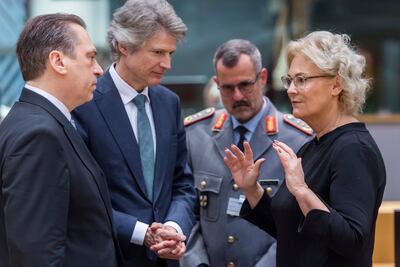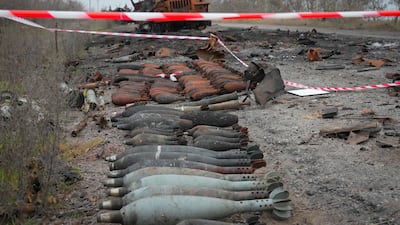The EU must increase its joint procurement efforts as military stocks have been depleted by the war in Ukraine, a meeting of the bloc's 27 defence ministers heard.
Foreign policy chief Josep Borrell, who was at the Brussels' meeting, said increased defence spending must be co-ordinated.
“In order to do it rightly and avoid wasting money, we have to do it more together,” he said. “European armies have to share.”
French Defence Minister Sebastien Lecornu said: “We have seen that our support of Ukraine has weighed heavily on our strategic stocks and on the capacity of our defence industry to regenerate these stocks rapidly.”
Nato chief Jens Stoltenberg, who also attended the meeting, welcomed the EU's efforts to coordinate procurement. He said that Europe had nine different kinds of battle tanks whereas the US only had one.
"This increases the costs of maintenance and production" for Europe, he said. "Therefore, efforts by the EU to address the fragmentation of the European defence industry is something we welcome in Nato."
Mr Borrell had earlier pledged continued supporting for Ukraine until the war with Russia is won.
EU members have so far provided €8bn ($8.32bn) in military support for Ukraine, said Mr Borrell, responding to accusations it was contributing less than the US.
Tuesday's meeting heard how only 8 per cent of military procurement was done collaboratively in 2021, far from the 35 per cent target set by the European Defence Agency.
“This is not satisfactory if you want to avoid fragmentation of the defence market,” a senior European External Action Service official said.
“We need to spend more but above all, better, and that means together.”
EU countries have listed their needs and Brussels will now present them to defence industry representatives. An assessment of what can be provided is not expected until next year.
Western countries have been scrambling to increase their weapons and ammunition production to continue supporting Ukraine’s war effort through the winter and outlast Russia.
“Probably early next year we’ll have good picture of the situation and see how the European industry is able to answer concretely to these needs,” said the EEAS official.
The EU commission in July proposed to commit €500 million of the EU budget over the next two years to reinforce Europe’s defence industry.
European officials also want to reduce dependencies on non-EU military contracts. “Out of all purchases, 60 per cent go to non-European equipment,” said the official.
“If we want to boost the competitiveness of the European industry, we have the strengthen our industrial base.”
The EU on Tuesday launched a two-year programme to jointly train 15,000 Ukrainian soldiers at a cost of €106.7 million.
Mr Borrell said that it was a response to a request from the Ukrainian military.
“War is a very sophisticated thing,” he said. “They require specific capacities to be able to use modern arms.”
The bloc allocated an additional €16 million to support the Ukrainian army with lethal military equipment, including ammunitions.

The EEAS official said 12,000 Ukrainian soldiers will be collectively trained and 2,800 will receive specialised training.
The bloc’s member states are expected to offer military training on their own soil. The official said that they had not received official offers yet but expects between 15 and 20 countries to participate.
Some countries have already publicly stated their intention to take part in the programme.
Germany's Defence Minister Christine Lambrecht on Tuesday said Berlin was planning to train 5,000 Ukrainians “in a wide range of skills” by next June.
Spanish Defence Minister Margarita Robles said her country would train 400 troops every two months, with a total capacity of 2,400 a year.
French President Emmanuel Macron previously said France would train 2,000 soldiers.
Poland, a neighbour of Ukraine with a close relationship with Kyiv, and Germany, which already houses an international military training centre for Ukrainian soldiers, are expected to play important roles in the mission.
The roll-out of the programme was described as slow by Latvian Defence Minister Artis Pabriks, who said his country had suggested a similar mission to support Ukraine two years ago.
Responding to such criticism, Mr Stoltenberg told reporters that many EU members had already participated in different ways in the military training of the Ukrainian army. Close to 10,000 troops have been trained in the UK just this year.
"Tens of thousands of Ukrainian troops have already been trained by Nato allies, and this has helped the Ukrainians to stand up against the Russian invasion," he said.


